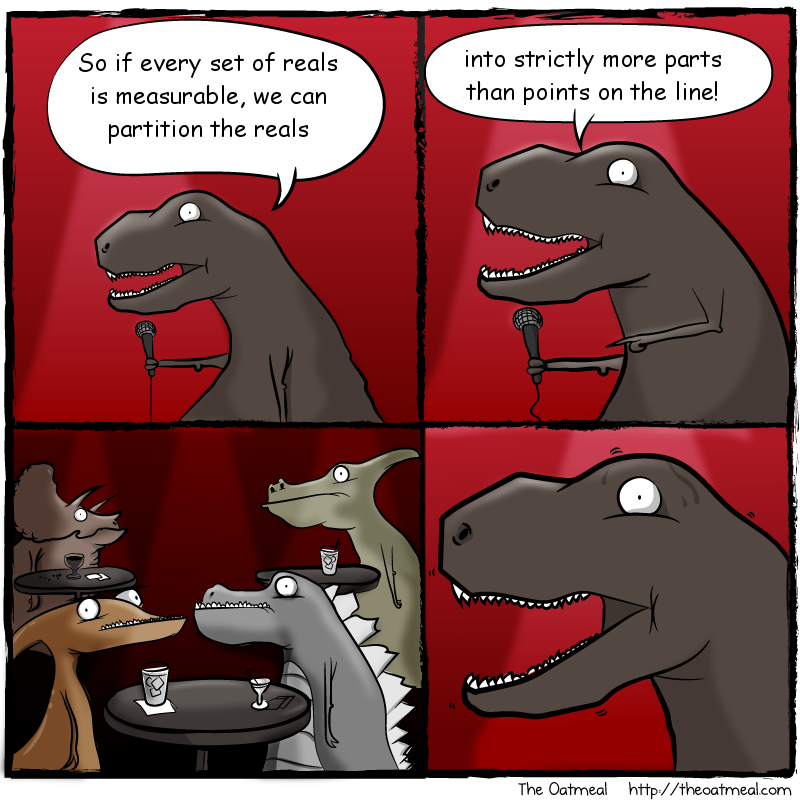Blog posts from 2015
MM70: Travel Grants for Students!
Dec 30 2015, 23:17
The registration to Menachem Magidor's 70th Birthday Conference is still open!
If you happen to be a student and a member of the Association for Symbolic Logic, you can apply for an ASL travel award. For more information as to how, please see here. There's just enough time to still submit your request!
Continue reading...Goodbye, Oren.
Dec 28 2015, 01:04
I recently heard the news that Oren Kolman passed away a couple of weeks ago.
Some of you may have known him through MathOverflow as "Avshalom" where he often appeared in the comments with generally useful references, and some of you may have known him in real life as a teacher or a colleague, or a student. Some of you may have even knew him as Eoin Coleman.
Continue reading...Michael, you're awesome.
Dec 09 2015, 00:13
After so many terrible YouTube videos about math, about four months ago Michael Stevens made a really nice video about the Banach-Tarski (Banach-T-Rex) paradox. This video was made surprisingly well by someone who has little to none formal mathematical education, but certainly the desire and [at least basic] prowess to understand that perhaps things are not as simple in mathematics - especially when infinite objects are involved - and perhaps you can't just drop something on your audience in hope they view you as a magician. Instead, Michael tried to educate the viewers, in a fairly reasonable way, about infinite objects and the preliminaries needed for the Banach-Tarski paradox.
You can find that video right here:
Continue reading...MM70: Registration is now open!
Dec 02 2015, 19:01
I am happy to announce, on behalf of the organizing committee, that the registration for Menachem Magidor's 70th Birthday Conference is now open!
Continue reading...Cofinality and the axiom of choice
Nov 29 2015, 22:35
What is cofinality of a[n infinite] cardinal? If we think about the cardinals as ordinals, as we should in the case the axiom of choice holds, then the cofinality of a cardinal is just the smallest cardinality of an unbounded set. It can be thought of as the least ordinal from which there is an unbounded function into our cardinal. Or it could be thought as the smallest cardinality of a partition whose parts are all "small".
Not assuming the axiom of choice the definition of cofinality remains the same, if we restrict ourselves to ordinals and \(\aleph\) numbers. But why should we? There is a rich world out there, new colors that were not on the choice-y rainbow from before. So anything which is inherently based on the ordering properties of the ordinals should not be considered as the definition of an ordinal. So first let's recall the two ways we can order cardinals without choice.
Continue reading...Don't worry about it
Nov 09 2015, 16:37
In a recent Math.SE question about the foundations of category theory without set theory, someone made a claim that \(\ZF\) makes it hard to learn mathematics, because in \(\ZF\) the questions "is \(\RR\subseteq\pi\)?" and "is \(\RR\in\pi\)?" can be phrased. They continued to argue that there are questions like whether or not hom-sets are disjoint or not, which are hard to explain to people who are "drunk on ZF's kool-aid".
So I raised a question in the comment, and got replies from two other people who kept repeating the age old silly arguments of what are the elements of \(\RR\times\RR\) or what are these or that elements. And supposedly the correct pedagogical answer is "It does not matter what are the elements of \(\RR\times\RR\)." With that I strongly agree, and when I taught my students about ordered pairs on the very first class of the semester, I made it very clear that there are other ways to define ordered pairs and that we only do that because we want to show that there is at least one way in which ordered pairs can be realized as sets; but ultimately we couldn't care less about what way they encode ordered pairs into sets, as long it is a "legal" way.
Continue reading...How do you read a paper?
Nov 01 2015, 10:29
Some time ago I was talking to some people about how they read a paper. And I learned that I am somewhat significantly different from a lot of people. I spent some time thinking about it, and I arrived at some interesting conclusions.
So here is how I read a paper, and I'd like to ask you to think about how you read a paper, and why you read it this way.
Continue reading...Banach-Tarski Banach-T-Rex
Oct 21 2015, 01:10
I had already written about anti-anti-Banach-Tarski arguments. But now the Mathematical T-Rex has something to say too.
Continue reading...The Thing Explainer Challenge
Sep 24 2015, 19:51
Randall Munroe of the xkcd fame has a new book coming up where he explains various concepts using a small repository of "simple" words (this is based on this xkcd comic). He recently posted this blog post, where he reveals a word checker program that he wrote to help him with the task.
So I figured, why not use this for explaining mathematical theorems.
Continue reading...Name that number
Sep 21 2015, 05:21
In the best TV show ever produced, Patrick McGoohan plays the mysterious No. Six. He lives in The Village, where former spies are held. The people there are essentially captive, and they all have numbers instead of names. But he is not a number! He is a free man!
We find a similar concept in Zelda's poem "Every man has a name" (לכל איש יש שם), which in Israel is closely associated with the Holocaust and with assigning numbers to people. But alas, we are all numbers in some database. Our ID numbers, employer number, the index under which you appear in the database. You are your phone number, and your bank account number. You are the aggregation of all these numbers. And more.
Continue reading...How to solve your problems
Sep 05 2015, 01:46
Anyone who peruses mathematical Q&A sites, or had students come to office hours or send questions via other means (email, designated forums, carrier pigeons, or written on a note tied to a brick tossed into your office) knows the following statement: "I don't know where to begin", or at least one of its variants.
Richard Feynman, who was this awesome guy who did a lot of cool things (and also some physics (but I won't hold it against him today)), has a famous three-steps algorithm for solving any problem.
- Write the problem down.
- Think. Real. Hard.
- Write the solution down.
Mathematical T-Rex
Aug 28 2015, 22:53
Ever explained to a "working mathematician" about the undecidability of the continuum hypothesis? I bet you too had felt like this T-Rex.
Continue reading...Is the Continuum Hypothesis a definite problem?
Aug 07 2015, 04:44
I am not a Platonist.
In general, while I do find it entertaining to think about god, afterlife, or a concrete mathematical universe, I find more comfort in the uncertainty of existence than I do in the likelihood that my belief is wrong, or in the terrifying conviction that comes along with believing in something (and everyone else is wrong).
Continue reading...Blurbs!
Jul 29 2015, 22:08
I don't like social media very much. I never really subscribed to the whole Friendster, MySpace, Facebook, Twitter, Google Wave, Google+, and what have you social network sort of approach that you need to have "friends" and "followers" and "follow" other people.
I always preferred to be the master of my domain. The king of my castle. But literally, not the Seinfeld euphemisms sense. In any case. I've been thinking about a page where I can post short thoughts about math, life and otherwise. The blog is not suitable, since I'm not going to add a post each time I have a new thought. So instead I've started a blurbs page. Each blurb has a number, and an anchored link that you can use in case you want to share it.
Continue reading...Young Set Theory 2015
Jul 20 2015, 01:34
Have you heard? Young Set Theory 2015 will take place in Jerusalem! How exciting is that? Tomorrow (Monday, July 20th) is the last day for registration. This means that you have only a few hours to get yourself together and send an application!
If you are not on this list, you better hurry up to this application form and register! Come on, what are you waiting for???
Continue reading...The rules of research
Jul 08 2015, 03:27
Here are the rules of research. Feel free to add your own.
- If it seems obvious, it's probably false as stated.
- If it seems obvious and true, it's probably false without additional hypotheses.
- If you think that you wrote a proof, you probably missed something obvious. See (1) and/or (2).
- You missed something obvious, see (1).
- When you go to see your advisor, suddenly all your thoughts align, and you find the solution.
- Two hours after finally talking with your advisor, you realize that your solution is obvious, therefore (1) or (2) apply.
- If you use forcing to prove the argument, then you probably missed some object being encoded generically.
- If you use forcing, and you didn't miss some crucial object, then you missed some other crucial object not being coded by the generic.
- When the truth is found to be lies, and all the joy within you dies...
- It's not false if you can force it.
- It's not true if you used the axiom of choice more than three times in the proof.
- It's not cheating if you asked a visitor to the university whose visit did not span longer than two weeks from the moment you asked them.
- If your question was about inner models, you may extend the above timespan to a month. Equally, if the question is about the axiom of choice, it should be shortened to a week.
- It's not considered unethical to make sacrifice in order to appease Mayan and Aztec gods. Just in case we got it wrong, and they're in charge of the mathematical universe.
- If it still seems obvious, you're probably right. It's still false, though.
- If you need six technical lemmas, whose proof is reduced to a single line (or just one lemma with an actual proof), then it's probably obvious. Unfortunately, see (1) and (2).
- If by some chance something is obvious, but you wrote out the proof, and it checks out, then it wasn't obvious at all.
- Remember what the dormouse said: feed your head.
- If you haven't watched Futurama in a while, then you're doing something wrong.
- Whatever happens, it's the other guy's fault. Also, see (1).
- I just work here, you know? I don't.
- Rolling a D20 die to determine the truth value of a statement is the original algorithm behind proof verification software.
- When you hit the wall, and you're about to give up and decide that whatever you're trying to prove is false, see (4).
- The only proofs that write themselves are obvious proofs. If your proof is obvious, see (2) and (3).
- To be honest, it needs more cowbell.
- Seriously, you're gonna want that cowbell in your proof.
- See (1), (2) and (4).
When the box means nothing
May 26 2015, 10:44
When assuming the axiom of choice the product topology and box the topology are quite different when considering infinite products. For example the Tychonoff product of countably many sets of three elements is compact, metrizable an all in all a very nice space. On the other hand, the box product is not separable or second countable at all.
But without the axiom of choice the world is indeed a strange place. This was posted as answer on math.SE earlier today.
Continue reading...I need your help!
May 08 2015, 15:51
The account has been suspended, I'd like to thank everyone who helped! I have removed the comments posted by "Isa Bria" after the real Isa Bria has contacted me and asked to remove them.
We have verified, in the meantime, that the same person impersonating me on Quora is the one who used Isa's name in those comments.
Continue reading...A problem and a possible solution
May 06 2015, 09:41
So closing in on my third year, and in theory I should finish my dissertation by next summer. This means that I should probably start the writing process around April (I'm a fast writer, what with having a quality keyboard and knowing LaTeX quite well).
But if I want to be sure that I can finish next year, I should probably omit one of the problems I originally wanted to solve; and keep that for later, unless it turns out to be particularly simple when I finish the rest.
Continue reading...The Torture of Mathematical Research
Apr 22 2015, 08:12
In a manner more befitting to Edgar Allan Poe, Mathematics is a cruel and unforgiving mistress.
Mathematics will often dangle in front of you some ideas, and you will work them out, to find a mistake. Then you will go back to the beginning, find new ideas that she had in store, work those out and proceed only to find a mistake much later. Then you go back to the beginning, and you find yet another minor idea that was missing, and now when everything works you continue. But then you find another gap, and you have to go back to the beginning and hope to find yet another idea. And don't get me started on those ideas that you find not to work during all these searches.
Continue reading...Turning Green!
Mar 17 2015, 00:16
Well, it's that special day of the year again. The holiest of days. The day we celebrate the patron of alcohol enthusiasts, Saint Patrick. So raise your whiskey glasses (my recommendation is Jameson 12 for those with deep pockets; Kilbeggan for those with shallow pockets), your Guinness pints, and wear green. Because tomorrow is all about soaking your brains in ethanol while listening to Irish folk songs, Irish punk rock (Thin Lizzy and Flogging Molly, for example) and other drinking songs.
Continue reading...Existentialism II, like Colonel Kurtz
Mar 11 2015, 00:34
Last night I posted a strange story about a gecko and a moth.
It occurred to me today that this is a very Kurtzian story, if we take the Brando interpretation of Mistah Kurtz (he dead) in Apocalypse Now! (the Redux version is one of my favorite movies, I guess). In the movie Harrison Ford plays a tape where Kurtz is describing a snail crawling along the straight edge of a razor, crawling slithering, this is his dream, this is his nightmare.
Continue reading...Existentialism
Mar 10 2015, 00:34
Spring has begun in Israel.
Yesterday was the first day where you could say that the weather is characteristically spring; and today (as well tomorrow) we are expected for a daytime heatwave and a nighttime cold weather (e.g. Beer-Sheva is expecting a whopping 31 degrees centigrade during the day, and 13 during the night).
Continue reading...Much needed terminology, that isn't going to happen any time soon
Feb 02 2015, 20:29
One of the reasons I love set theory so much, and specifically choice related research, is that this is an extremely fertile ground for amusing terminology. We have forcing, cardinals, collapsing, we have all sort of gems and rodents at our disposal... we even have a swamp thing.
Here are a few terminological ideas that I doubt are going to be developed by anyone. But if you plan on doing something similar (or if my terminology inspires some proof) feel free to use these terms, and please let me know!
Continue reading...

